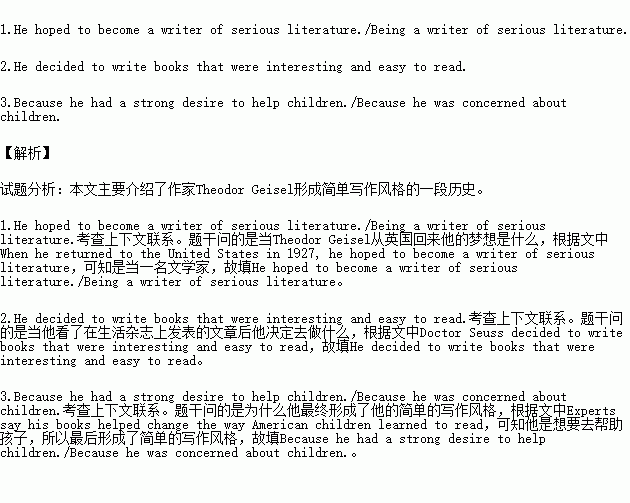题目内容
阅读短文,根据短文回答问题,并将答案写在相应位置。
Doctor Seuss was the name used by Theodor Seuss Geisel, who was famous because of the books he wrote for children. They combine funny words, funny pictures, and social opinion.
Theodor Geisel was born in Springfield, Massachusetts in 1904. After graduating from Dartmouth College in 1924, he spent a year studying literature(文学) at Oxford University in England. When he returned to the United States in 1927, he hoped to become a writer of serious literature. But the economic depression(经济萧条) in the United States delayed his dreams of becoming a serious writer. In 1937, he wrote his first book for children, which is called “And To Think I Saw It on Mulberry Street.” However, a number of publishers refused to accept it. They said it was too different from ordinary books. A friend finally published it. Soon other successful books followed. Over the years he wrote more than forty children’s books, which were fun to read. Yet his books sometimes dealt with serious subjects including equality, responsibility and protecting the environment.
Doctor Seuss had a strong desire to help children. In 1954, Life magazine published a report about school children who could not read. The report said many children’s books were not interesting. Reading the report, Doctor Seuss decided to write books that were interesting and easy to read. To make his book easy to read, he used words with the same ending sound, like fish and wish.
In 1957, Dr. Seuss wrote “The Cat in the Hat”, in which he used less than two hundred twenty-five words. This was the number of words a six-year-old should be able to read. The book was an immediate success. Children loved it. Their parents loved it, too. Today many adults say it is still one of the stories they like best. The success of the book made him want to write more books for children. He started a series called Beginner Books, which remain well liked among children today.
In 1984, Mr. Geisel won a Pulitzer Prize for children’s literature. At that time he had been writing children’s books for almost fifty years. He was honored for the education and enjoyment his books provided American children and their parents, and his influence remains through the books he wrote. Experts say his books helped change the way American children learned to read.
1.What was Theodor Geisel’s dream when he returned from England?
2.What did Theodor Geisel decide to do after he read the report published in Life magazine?
3.Why did Theodor Geisel finally set his simple writing style?
书面表达。
中秋节是中国的传统节日,你的美国笔友Mike请你在他们的校报上介绍一下中秋节的情况,请你根据下表写一篇短文。
【写作内容】
中秋节简介
时间 | 每年阴历八月十五日,是中国最重要的传统节日之一。 |
范围 | 中国及亚洲其它一些国家都会庆祝。 |
象征 | 人们认为月亮是团圆、运气、财富的象征,在那天会互相表达祝福。 |
方式 | 在那一天,人们通常回家与家人团聚,共聚晚餐。人们还会吃月饼,那是一种圆圆的饼,里面有肉、果仁、鸡蛋等。 |
【写作要求】
1)词数100左右
2)不要逐字翻译,要组成一篇通顺连贯的短文。
【参考词汇】
the lunar calendar阴历

